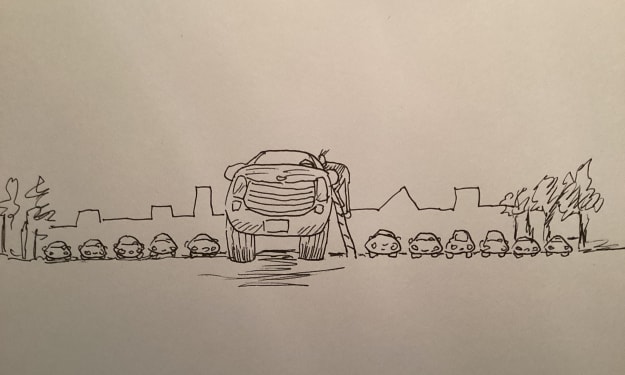
WHAT HAPPENS WHEN YOU DIE
Despite the prevailing scientific understanding of death in modern times, it appears that many individuals still hold beliefs in the existence of an afterlife. In 2014, a survey conducted by the Telegraph in the UK revealed that just under 60 percent of respondents expressed a belief in some form of continued existence after death. Similarly, in the United States, a predominantly Christian nation, Pew Research conducted a study in 2015 to explore people's beliefs regarding the afterlife. The findings indicated that 72 percent of Americans believed in the concept of heaven, which was described as a realm where individuals who have led virtuous lives are eternally rewarded. Additionally, 54 percent of U.S. adults expressed a belief in hell, which was described as a place of eternal punishment for those who have lived wicked lives without remorse. With these perspectives in mind, we delve into this episode of the Infographics Show, where we explore the question: What occurs when we pass away? To begin, let us examine the factual realities of what happens to the physical body upon death.
Physicians determine death by observing the cessation of heart activity and the absence of electrical signals in the brain. When brain death occurs, it signifies the end of life, although medical devices can temporarily sustain bodily functions. Another form of death is cardiac death, which occurs when the heart stops beating and blood ceases to circulate throughout the body.
Interestingly, individuals who have experienced cardiac death but were revived have reported being conscious of their surroundings. Some have even described near-death experiences where they perceive moving towards a bright light. While it is possible to be revived from what is known as clinical death, there is only a limited window of approximately 4-6 minutes. However, if one were to reach the light and pass through it, this would signify biological death - the end of the game, the final whistle, and being completely deceased.
Now, this is where things become somewhat undignified, but since you are no longer alive, it hardly matters. Once you have passed away, your muscles relax, including the sphincter muscles, which means that any food you had consumed, such as a triple Whopper and large fries for lunch, will be expelled from your body. Additionally, any gas present in your body may escape and create an unpleasant odor.
The same applies to the urine in your bladder, so it's not surprising that dying can be quite messy. In the case of men, there is even a possibility of ejaculation. Women, on the other hand, may experience something known as "coffin birth" if they were pregnant at the time of death. Although it is not a common occurrence, the gases in the abdomen can exert enough pressure to deliver the newborn. As the body eliminates trapped substances, air may escape through the mouth, resulting in emitted noises. Nurses and individuals working closely with deceased bodies have frequently reported hearing moans and groans that sound remarkably alive. Any twitching observed is simply a result of muscle contractions and does not indicate signs of life. In certain circumstances, such as lying on the stomach, an erection may occur due to blood pooling in that area after death.
Livor mortis, also known as postmortem lividity, causes certain parts of the body to develop a dark purple color due to blood pooling. This phenomenon is often seen on television. Without blood circulation, the body gradually cools down, a process referred to as algor mortis or "death chill." The body will continue to cool until it reaches the same temperature as its surroundings. Rigor mortis, the stiffening of the muscles, typically sets in within 2-6 hours after death. This occurs as calcium enters the muscle cells. Without blood flow, cells begin to break down, leading to bacterial growth and decomposition. Although it may appear as though hair and nails are growing, this is actually the result of the skin receding, creating an illusion of growth. The skin will also become loose, and blisters may form on the body. The subsequent stage is putrefaction, during which bacteria and microorganisms feast on the body. As a result, a strong and unpleasant odor will emanate from the decomposing body, surpassing anything one could have imagined while alive.
One individual provided a vivid description of the odor, likening it to a combination of putrid eggs, excrement, and a neglected toilet left out for an extended period, amplified a thousandfold. This repugnant scent is deemed unholy. As time progresses, organic matter undergoes liquefaction, while certain elements such as bones, cartilage, and hair retain their durability. By the time you are interred, decomposition is already well underway. However, if embalmed and buried, the process of decomposition may be considerably slower. If left exposed above ground, within approximately a month, you will transform into a liquefied mess, serving as sustenance for insects, maggots, plants, and animals.
According to experts, it may take anywhere from 8 to 12 years for you to be reduced to a mere skeleton if buried underground. After approximately 50 years, even your bones will integrate with the Earth, becoming part of its composition. It is important to note that the rate of decomposition is influenced by numerous factors, too extensive to enumerate here. Nevertheless, we believe you grasp the concept. While some individuals recount awe-inspiring near-death experiences, this is not always the case. A Reddit user shared their personal encounter, describing it as a void of darkness devoid of thoughts, consciousness, or any semblance of existence.
René Descartes, the French philosopher, held the belief that the soul and the body are distinct entities, a notion shared by many religions. According to Descartes, there may be something that persists even after death. Friedrich Nietzsche, on the other hand, discussed the idea of eternal recurrence or eternal return, which suggests that all energy and existence in the universe will continue to repeat itself indefinitely. This means that we will live the same life over and over again, for eternity. Doesn't this realization inspire us to live a good life? We can draw parallels here with the Buddhist concept of the "Wheel of Samsara," where souls and lives go through a cycle of rebirth after death, although not necessarily the same life. This is what we refer to as reincarnation, which some people connect to the phenomenon of déjà vu. Buddhists believe that by attaining true enlightenment and reaching nirvana, we can break free from this endless cycle. Alternatively, some believe that after our physical bodies cease to function, we may ascend to heaven and be welcomed by St. Peter at the Pearly Gates. However, we may worry that he will deny us entry for that candy bar we stole during a school trip to Niagara Falls.
Is it possible that we will enter paradise, a realm abundant with delectable cuisine and stunning women who render our knees feeble? Alternatively, will we merely contribute to the growth of life on Earth, with our souls being nothing more than a temporary distraction from our cosmic insignificance and the occasional sense of futility we encounter on this solid ground? This is certainly something worth contemplating.
About the Creator
Enjoyed the story? Support the Creator.
Subscribe for free to receive all their stories in your feed. You could also pledge your support or give them a one-off tip, letting them know you appreciate their work.





Comments
There are no comments for this story
Be the first to respond and start the conversation.